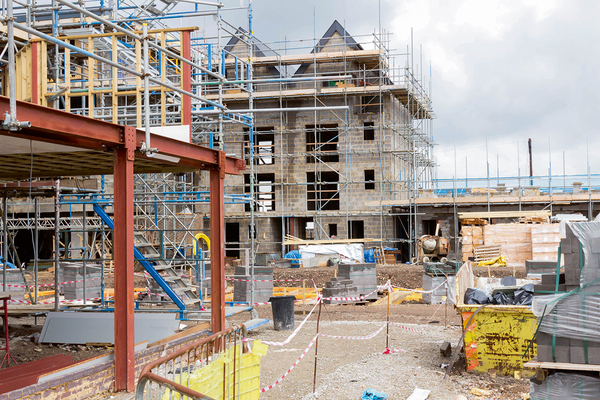You are viewing 1 of your 1 free articles
 Terrie Alafat CBE
Terrie Alafat CBENow we need to turn the conversation towards affordability
Ministers are clearly listening – now we need to push social rent to the top of the agenda, says Terrie Alafat
It’s no exaggeration to say we’ve seen a sea change in the UK government’s approach to housing in just a few months.
The Spring Budget in March contained so few housing-related measures that we didn’t produce our usual detailed briefing for Chartered Institute of Housing (CIH) members – there simply wasn’t enough for our policy team to analyse.
Fast forward, and Theresa May has pledged to take personal charge of the government’s response to the housing crisis.
Increased investment in affordable housing was the centrepiece of her speech to this year’s Conservative Party conference and housing also took centre stage in November’s Autumn Budget.
We have a new rent settlement for social landlords, confirmation that the Local Housing Allowance cap will not apply to social housing, and a Social Housing Green Paper in the pipeline which ministers say will be a top-to-bottom review of the issues facing the sector.
Of course, it should not have taken the tragedy of Grenfell Tower to put social housing back in the spotlight.
But ministers and officials are clearly listening – and it is our duty to make sure the voices of those who live and work in social housing are heard.
We also need to turn the conversation towards one of the biggest issues people across the UK are facing: affordability.
It came up time and time again when we started to discuss our new project, Rethinking social housing, which we hope will help shape the future of social housing.
It is clearly coming up in the roadshows that housing minister Alok Sharma is hosting as a way of meeting tenants and discussing their concerns, too.
According to Jenny Osbourne, chief executive of Tpas, in her report on the roadshows so far, “there’s no doubt that Mr Sharma and his team have got the message that no one sees affordable rent as affordable and that everyone is calling for a return to social rents that people can genuinely afford”.
We cannot underestimate the potential impact if things go on as they are. Following the Autumn Budget, we have had confirmation that the government’s freeze on working-age benefits, including housing benefit, will continue for another year, until April 2019.
Thinktank the Resolution Foundation said that a typical working family with two children would lose £315 a year as a result of the policy. It has also warned that the UK is on course for the longest fall in living standards since records began in the 1950s.
Downgrades to economic growth forecasts mean that household disposable incomes are now set to fall until 2020, with the poorest third of households set for an average loss of £715 a year by the end of the current parliament.
Meanwhile the Institute for Fiscal Studies has said that British workers face two lost decades of stagnant wages.
“Downgrades to economic growth forecasts mean that household disposable incomes are now set to fall.”
This all comes at a time when numbers of genuinely affordable homes are falling. While annual housing supply in England amounted to a very encouraging 217,350 net additional dwellings in 2016/17, Inside Housing analysis has shown that just 2.5% of those homes were for social rent – down from 3.6% in the previous year and the lowest percentage since the net additions records began in 2001.
Government statistics released in November this year show that 23,186 social homes were sold in 2016/17 in England (up 5% compared with the previous year), while separate figures revealed that the number of new social rented homes delivered dropped to 5,380, down from 39,560 in 2010/11.
The CIH’s own analysis shows that almost 250,000 homes for social rent could be lost between 2012 and 2020.
As we have consistently pointed out, social rent is the only truly affordable option for many people on lower incomes.
We have been shouting about the urgent need for investment in genuinely affordable homes for rent for a long time.
It is gratifying to hear an increasing number of voices join us and to see some recognition from ministers that social rent deserves attention.
“Social rent is the only truly affordable option for many people on lower incomes.”
We need to make sure that people who cannot afford market prices can still access a safe, secure home; and of course investment in affordable housing makes economic sense too – new research from Savills shows that grant funding for new affordable homes could cut the housing benefit bill by £430m a year.
Ms May’s recent announcement of an extra £2bn investment in affordable housing was a welcome first step, and the government’s pledge to deliver 300,000 homes a year in England is the right ambition.
But as my colleague Melanie Rees, head of policy, has pointed out, this is not just a numbers game; it’s about making sure that we build the right homes in the right places and that people can afford them.
The Autumn Budget was light on measures that could make a real difference to improving affordability. We must keep pushing this crucial issue to the top of the agenda.
Terrie Alafat, chief executive, Chartered Institute of Housing
KEY BUDGET MEASURES AT-A-GLANCE
- Investment of £44bn in housebuilding in capital funding, loans and guarantees over the next five years to boost supply of skills, resources and land
- Commitment to be building 300,000 homes a year by mid-2020s
- £1.5bn package of changes to Universal Credit announced. This includes the scrapping of the seven-day waiting period at the beginning of a claim, making a full month’s advance available within five days of a claim for those that need it and allowing claimants on housing benefit to continue claiming for two weeks
- Lift council borrowing caps in "high-demand areas"
- A £125m increase over two years in Targeted Affordability Funding for Local Housing Allowance claimants in the private sector struggling to pay their rent
- New money into Home Builders Fund
- Extra £2.7bn for Housing Infrastructure Fund
- Invest £400m in estate regeneration
- £1.1bn on unlocking strategic sites
- Stamp duty for first time buyers on properties worth up to £300k will be axed, while the first £300k on properties worth up to £500k will also be scrapped
- Three new Housing First pilots announced for West Midlands, Manchester and Liverpool
- Councils to be given the power to charge 100% council tax premium on empty properties
- Government will launch a consultation to barriers to longer tenancies in the private rented sector
- £38m for Kensington & Chelsea Council for mental health and counselling services, regeneration projects in areas surrounding Grenfell Tower and a new community space
- Invest in five new garden towns
- £125m increase in Targeted Affordability Funding for Local Housing Allowance claimants in the private sector struggling to pay rent












